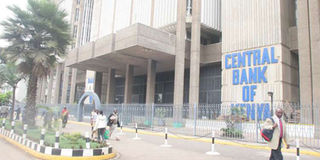Let M-Akiba open up the State securities markets to wananchi

Central Bank of Kenya. The bank is evaluating the proposed M-Akiba, the platform that will make it possible for ordinary retailers and savers to invest and start enjoying the high interest rates that bigger investors get from buying Treasury bills. PHOTO | NATION MEDIA GROUP
What you need to know:
- We are on the brink of witnessing one of the biggest game changers of our time, namely, the opening up of the government debt markets to ordinary citizens.
- The telecommunications sector in this country is gradually evolving into a scaring oligopoly with the capacity and political influence to capture regulatory authorities
- If we open up government securities markets to Wanjiku, the long-term impact will be a gradual loosening of the stranglehold that commercial banks have over Treasury bill and bond auctions.
So, which local telecommunications companies will be chosen to provide the ICT infrastructure needed to service the proposed M-Akiba, the platform that will make it possible for ordinary retailers and savers to invest and, therefore, start enjoying the high interest rates that bigger investors get from buying Treasury bills?
We are on the brink of witnessing one of the biggest game changers of our time, namely, the opening up of the government debt markets to ordinary citizens. It is going to be very big business for the telcos.
All mobile money providers are waiting with bated breath, calculating and strategising how to get the biggest slice of what is going to be a big money spinner.
Which is why it does not come as a surprise that some of the mobile money providers are already complaining that the National Treasury and the Central Bank of Kenya are not involving them enough in the consultations and plans.
Personally, I initially thought that M-Pesa was going to be the platform of choice for M-Akiba. But does it really make sense to allow one private player to own such a critical piece of the nation’s financial market infrastructure?
The Nairobi Automated Clearing House is owned by commercial banks under the auspices of the Kenya Bankers Association. The infrastructure is operated and hosted at the Central Bank of Kenya premises, which also manages settlements.
The Central Depository and Settlement Corporation, another key financial markets infrastructure system servicing capital markets, is owned publicly.
APPOINT PRIMARY DEALERS
Why don’t we allow all mobile money providers to participate and make money from this new venture?
Indeed, the telecommunications sector in this country is gradually evolving into a scaring oligopoly with the capacity and political influence to capture regulatory authorities.
In the end, I see these things forcing the government to, at last, introduce primary dealers.
It will be costly and inefficient for every retail customer to interface directly with the issuer — the Central Bank of Kenya (as the fiscal agent for the government).
The government will have to appoint primary dealers from the ranks of major commercial banks who can then aggregate bids from the small investors.
If we open up government securities markets to Wanjiku, the long-term impact will be a gradual loosening of the stranglehold that commercial banks have over Treasury bill and bond auctions.
We all know that one of the biggest impediments to sustainable economic growth is a low national savings rate. We are always reminded that we have to increase our national savings rate to between 30 and 40 per cent to reach the investment levels that led to the growth levels witnessed in South East Asia.
And, why doesn’t Wanjiku save? It is because small savers in this country hardly get the opportunity to earn good returns on their hard-earned savings.
TREASURY BIL RATE
When you deposit your money with the bank today, they will pay you a rate of 8 per cent. The banks take the same money and lend it to the government at the prevailing Treasury Bill rate of 8.8 per cent.
If we implement M-Akiba successfully, we will make it possible for small savers to realise good returns from their savings.
Even more important, we will be allowing the small saver to invest in risk-free instruments. Commercial banks can collapse, but investing in Treasury bills amounts to investing in a sovereign institution.
Let every Kenyan citizen with a mobile phone be allowed to invest in government paper.
I hope that the denominations will be made as small as possible to allow the boda boda rider, the village shopkeeper, the mitumba dealer, and the matatu tout to access the government’s securities market.
The small saver is being forced to put his money in illiquid avenues of saving such as chama, where you have to wait for months on end before you can be paid a lump sum.
If you are in doubt about the amount of money the small saver in this country is capable of mobilising or whether a retail market for government paper is feasible, ask the management of Commercial Bank of Africa to share with you M-Shwari’s monthly volumes. The numbers run into billions of shillings.
We must force banks to start lending money to businesses and to stop depending too much on lending to the government.





